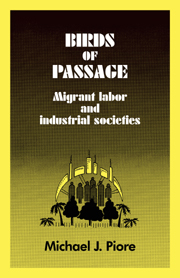Book contents
- Frontmatter
- Contents
- Preface
- 1 Introduction
- 2 The jobs
- 3 The migrants
- 4 Particular characteristics of the migrant labor market
- 5 The impact of migration on the place of origin
- 6 The historical evolution of long-distance migration in the United States
- 7 The dilemmas of current U.S. immigration policy
- Notes
- Bibliography
- Index
- Frontmatter
- Contents
- Preface
- 1 Introduction
- 2 The jobs
- 3 The migrants
- 4 Particular characteristics of the migrant labor market
- 5 The impact of migration on the place of origin
- 6 The historical evolution of long-distance migration in the United States
- 7 The dilemmas of current U.S. immigration policy
- Notes
- Bibliography
- Index
Summary
The Irish emigration into Britain is an example of a less civilized population spreading themselves, as a kind of substratum, beneath a more civilized community; and, without excelling in any branch of industry, obtaining possession of all the lowest departments of manual labor.
Before 1880, “English-speaking” workmen had manned America's iron and steel plants. Then immigrants from South and East Europe began to arrive in increasing numbers. More than 30,000 were steel workers by 1900. The newcomers soon filled the unskilled jobs in Northern Mills … The recent arrivals dominated the bottom ranks of the steel industry.
Most of the Negroes who came North went into lower paid work requiring little or no skill or experience. The bulk of them became unskilled or semi-skilled operatives in the steel mills, automobile plants, foundries and packing houses. Many went to work at road building and other construction jobs. Others, and this includes many women, went into commercial laundries, food industries, and the less skilled branches of the Needle trades. In some cities certain of the specialized sewing trades, for example, the making of lamp shades in Chicago, have come to depend very heavily upon the labor of Negro women.
The jobs into which the Negroes went were usually those which native Americans or Americanized foreignborn white labor did not want.
Immigrant workers in France, Germany, Switzerland and Britain are usually employed in occupations rejected by indigenous workers … Typically such jobs offer low pay, poor working conditions, little security and inferior social status.
- Type
- Chapter
- Information
- Birds of PassageMigrant Labor and Industrial Societies, pp. 15 - 49Publisher: Cambridge University PressPrint publication year: 1979



